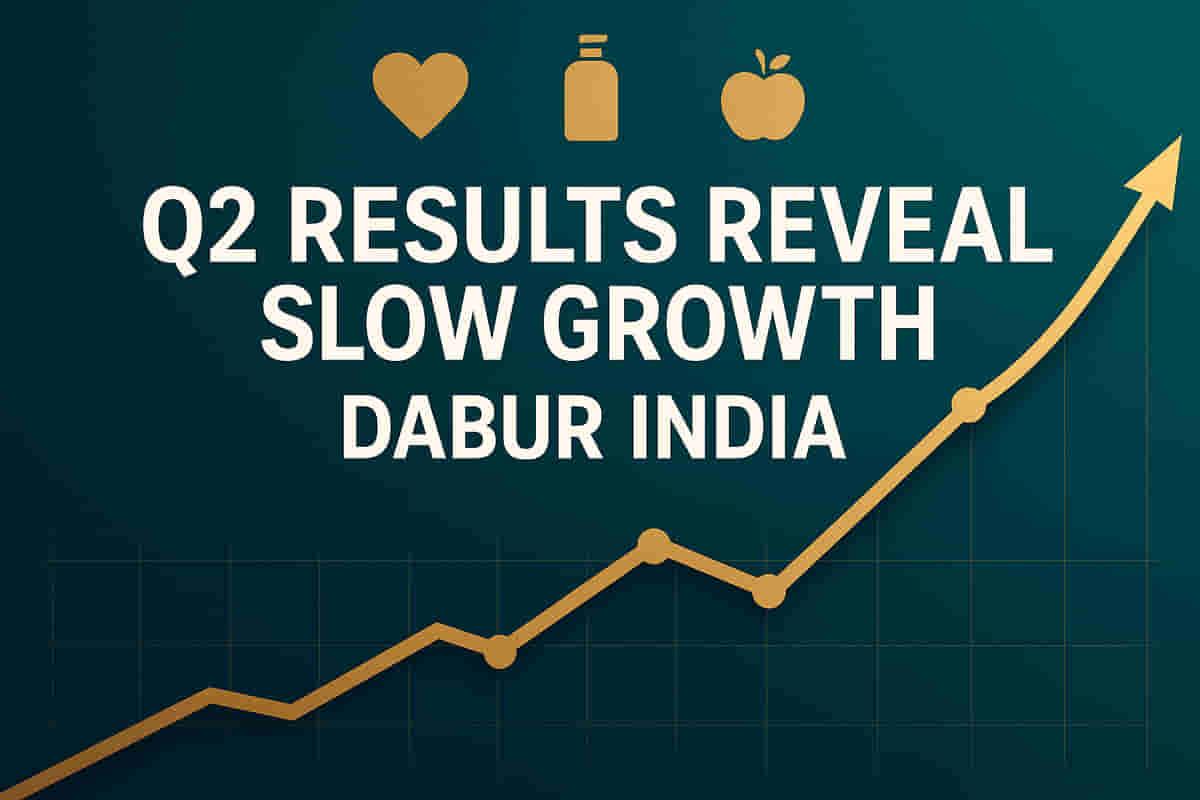Dabur India Q2 Results: Muted Growth Sees Analysts Trim Targets Amidst Expectation of H2 FY26 Recovery
Consumer Products
|
31st October 2025, 6:55 AM

▶
Stocks Mentioned :
Short Description :
Detailed Coverage :
Dabur India reported its September quarter financial results, showing a 5.4% year-on-year rise in consolidated sales, driven by a 4.3% increase in its domestic business. However, the overall India volume growth was a modest 2%. The Home & Personal Care (HPC) segment was the strongest performer, growing 8.9%, particularly in oral care. In contrast, the healthcare and foods & beverages segments showed muted growth of 1.3% and 1.7% respectively.
Analysts pointed to the ongoing Goods and Services Tax (GST) transition, which moved 66% of Dabur's portfolio to a lower 5% slab, and delayed winter inventory loading as key reasons for the subdued volume growth, estimating an impact of 300-400 basis points. Gross and Ebitda margins saw modest expansions of 10 and 20 basis points, respectively, aided by price increases and cost efficiencies. Management expects margins to remain stable.
Dabur's share price experienced a decline of approximately 2.5% following the announcement.
Brokerage Views: * **InCred Equities** maintained a ‘Hold’ rating with a reduced target of ₹540, expecting gradual sales momentum improvement in H2 FY26. They noted Dabur's strength in rural markets and oral care, and positively viewed the new investment platform, Dabur Ventures. * **Nuvama Institutional Equities** retained its ‘Buy’ rating but trimmed the target to ₹605 after cutting earnings estimates. They anticipate a stronger H2 FY26 driven by a potential harsh winter (La Niña) boosting healthcare demand and GST benefits improving affordability. * **Motilal Oswal Financial Services** downgraded the stock to ‘Neutral’ with a target of ₹525, citing persistent execution challenges and weak rural demand. They reduced their valuation multiple, expressing reduced confidence in immediate growth recovery. * **JM Financial** kept an ‘Add’ rating and ₹535 target, viewing the results as in line. They see mid-to-high single-digit growth in H2 FY26 as achievable through GST rationalisation, expected colder weather, and steady rural demand.
Impact: The news indicates a mixed sentiment on Dabur India. While margins are stable and key segments like oral care are performing well, overall growth momentum is slow. Brokerages have revised target prices downwards, reflecting short-term concerns. The outlook for the second half of FY26, dependent on seasonal factors and GST benefits, is cautiously optimistic. This could affect investor sentiment towards Dabur and potentially other Fast-Moving Consumer Goods (FMCG) companies facing similar headwinds. Rating: 7/10
Difficult Terms: * **GST (Goods and Services Tax):** A unified indirect tax system implemented in India to replace multiple central and state taxes. * **FMCG (Fast-Moving Consumer Goods):** Products that are sold quickly and at a relatively low cost. Examples include packaged foods, beverages, toiletries, and other everyday consumables. * **Y-o-Y (Year-on-Year):** A comparison of financial or business performance data from one period with the data from the same period in the previous year. * **Basis Points (bps):** A unit of measure used in finance to denote one-hundredth of a percentage point. 100 basis points equal 1%. * **Ebitda Margins:** Earnings Before Interest, Taxes, Depreciation, and Amortization margins, a measure of a company's operating performance. * **FY26 (Fiscal Year 2026):** Refers to the financial year ending March 31, 2026. * **H2 FY26 (Second Half of Fiscal Year 2026):** The period from October 1, 2025, to March 31, 2026. * **La Niña:** A climate pattern that describes the cooling of surface water in the eastern Pacific Ocean. It can influence global weather patterns, often leading to colder winters in some regions. * **Rural Markets:** Areas outside of major cities and towns, characterized by lower population density and often agricultural economies. * **Urban Areas:** Densely populated cities and towns. * **Oral Care:** Products related to hygiene of the mouth, such as toothpaste and mouthwash. * **Portfolio:** The range of products or services offered by a company. * **Brokerage:** A firm that acts as an intermediary between an investor and a securities exchange. They help buy and sell stocks on behalf of investors. * **Target Price:** The price level at which a broker or analyst believes a stock will trade in the future, typically within 12-18 months. * **Retained:** To keep or continue with something, such as a rating or strategy. * **Execution Challenges:** Difficulties a company faces in implementing its business strategies or operational plans effectively. * **Management Commentary:** Statements and explanations provided by a company's leadership regarding its performance, strategy, and outlook. * **Macros:** Refers to macroeconomic factors like economic growth, inflation, interest rates, and government policies that influence investment decisions.